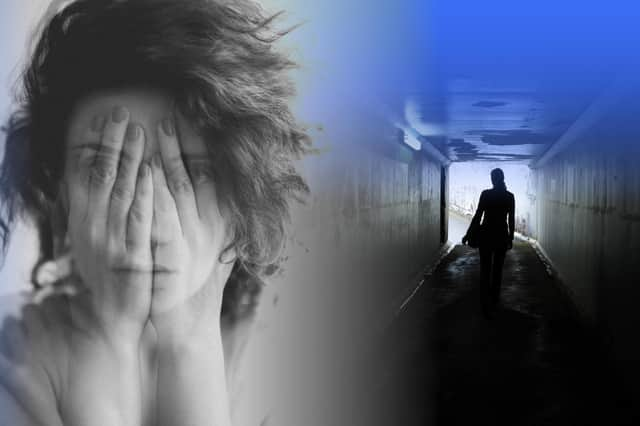Rape charge rate: just one in 20 rapes resulted in criminal charges in 2020 - why the Guardian got this story wrong


Slightly more rape victims are seeing their alleged attackers face criminal action following a marginal improvement in police charge rates – but 19 in 20 cases are still closed with no charges brought.
It comes as the Guardian wrongly reported in a front-page story on Monday (24 May) that just one in 62 rape cases resulted in a charge in 2020. The story was purportedly based on an analysis carried out by the Liberal Democrats and passed to the newspaper.
Advertisement
Hide AdAdvertisement
Hide AdPolice forces across England and Wales recorded 52,210 rape offences in 2020, according to the latest Home Office figures, with charges brought in just 843 cases – which the Guardian said gave a charge rate of 1.6%.
But this incorrectly included 15,000 cases that have not yet been assigned an outcome because the police are still dealing with them. The charge rate rises to 2.3% once incomplete cases are excluded.
Separate figures from the same Home Office database which cover cases assigned an outcome in 2020 regardless of when the crime took place – a more accurate way to measure trends over time – show police forces wrapped up 55,372 rape cases during the year.
Of these, 2,799 ended with a suspect being charged, giving a charge rate of 5.1% – a marginal improvement on 2019’s rate of 4.3%, but which still leaves 19 in 20 cases closed with no police action.
Advertisement
Hide AdAdvertisement
Hide AdGreater Manchester Police has been unable to supply crime data since July 2019, so rapes that took place here are missing from the most recent national figures.
What has happened to charge rates over time?
The proportion of rape cases resulting in charges has plummeted in the last few years.
Of the cases assigned an outcome in 2016, 12.8% saw charges brought.
That fell to 8.9% in 2017 and 4.4% in 2018.
It is a similar picture when looking at outcomes for rapes by the year they were first recorded, excluding those that have not yet been assigned an outcome.
Advertisement
Hide AdAdvertisement
Hide AdBy this measure – which is currently at 2.3% for rapes recorded in 2020 – the charge rate in 2016 stood at 10.6%.
In 2017 it fell to 6.5%, to 4% in 2018, and 3.5% in 2019.
Where does the problem lie?
Both the police and the Crown Prosecution Service (CPS) play a role in deciding when to charge a suspect.
Charity End Violence Against Women and Girls (EVAW) and legal group the Centre for Women’s Justice lost a legal battle at the Court of Appeal in March seeking a judicial review over what they describe as the CPS’s failure to prosecute enough alleged rapists.
They say the CPS changed its decision making processes in 2016 to raise the evidence threshold for prosecutions, moving towards a policy of selecting only ‘safe’ cases to take forward – something the CPS denies.
How does it vary across the country?
Advertisement
Hide AdAdvertisement
Hide AdThere is enormous variation in charge rates across England and Wales.
Of cases that were assigned an outcome in 2020, the British Transport Police had the lowest charge rate at 2.7%, followed by Dyfed-Powys and Wiltshire, both on 3%.
At the other end of the scale is Durham Constabulary with a rate of 12.7%, Northumbria on 9.9% and Gwent on 9.1%.
What do the authorities say?
A spokesperson for the National Police Chiefs’ Council said the improvement in the charge rate was welcome but that more still needs to be done.
Advertisement
Hide AdAdvertisement
Hide Ad“The trend of police referring more and more rape cases to the CPS for a charging decision is continuing,” they said.
“Whilst that is welcome, we know there is much more to do and work continues at pace to improve the entire criminal justice system response to rape and serious sexual offences.
“Officers are working hard to build the strongest possible cases so more victims get the opportunity to have the evidence heard in court, however the disparity between reports to police and criminal justice outcomes remains a great concern.
“With the CPS we are implementing a joint action plan with the aim of improving outcomes for victims.
Advertisement
Hide AdAdvertisement
Hide Ad“This includes better training for officers on dealing with trauma, making sure we gather strong evidence from the outset and working closely with Independent Sexual Violence Advisors so we can support victims in the best way possible.”
The Ministry of Justice said it is carrying out an end-to-end Rape Review to look at how every stage of the criminal justice system handles rape cases.
“Victims of rape deserve to know that their cases will be taken seriously and everything will be done to bring offenders to justice,” a spokesperson said.
“That is why we are reviewing the response to this horrific crime, in consultation with survivors’ groups and experts across the sector, and will set out next steps in due course.”
The Liberal Democrats and the Guardian were approached for comment.
